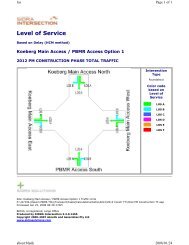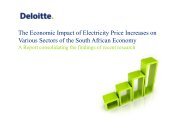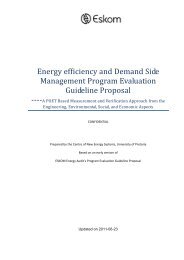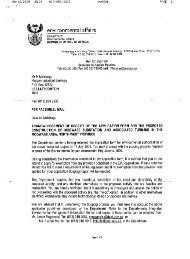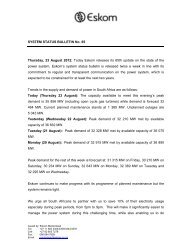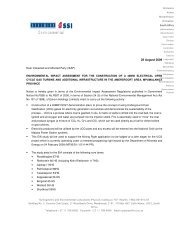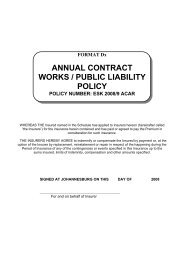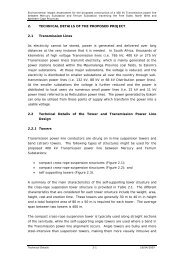Part 1 Revenue Application: Multi-Year Price Determination ... - Eskom
Part 1 Revenue Application: Multi-Year Price Determination ... - Eskom
Part 1 Revenue Application: Multi-Year Price Determination ... - Eskom
You also want an ePaper? Increase the reach of your titles
YUMPU automatically turns print PDFs into web optimized ePapers that Google loves.
Overview of <strong>Multi</strong>-<strong>Year</strong> <strong>Price</strong> <strong>Determination</strong><br />
2013/14–2017/18 (MYPD 3)<br />
Page 88 of 144<br />
Businesses that can pass on the electricity price increases to their customers will do so,<br />
while price-takers will not be able to. This practice, coupled with the direct impact of an<br />
increased electricity price on the CPI, will inevitably push up South Africa‟s inflation rate.<br />
This will put pressure on interest rates, which in turn will limit consumption, investment<br />
spending and job creation. Economic growth will, in the short term, almost certainly be<br />
stifled. However, as electricity supply becomes less constrained and electricity price<br />
increases level out, the country‟s expanded production ability will reinvigorate the economy,<br />
stimulating consumption, inviting investment and creating jobs.<br />
4.3 Impact on inflation<br />
Electricity currently accounts for 1.6% of the CPI basket. CPI is a tool for measuring changes<br />
in the price of a set of consumer goods and services. Because of its relatively low weight in<br />
the basket, a 16% electricity price increase for 2013/14 would translate to a direct increase<br />
of about 0.3 percentage points in the CPI.<br />
However, the basket of goods making up the CPI is reweighted every five years to reflect<br />
changing patterns of expenditure. It is likely that electricity will be given a greater weight in<br />
the 2013 CPI basket reweighting to reflect the effect of the price increases over the past five<br />
years. The National Treasury estimates this reweighting could result in electricity price<br />
increases contributing to a CPI increase of between 0.7 and 1 percentage points.<br />
Electricity price increases will also have a pronounced secondary effect on inflation. As<br />
noted earlier, those companies that can pass on electricity price increases to customers will<br />
do so, resulting in potentially severe “second round” effects.<br />
4.4 Impact on investment<br />
South Africa needs to carefully consider what kind of economy it would like to have. As the<br />
2011 Pan African Investment and Research Services study pointed out, electricity prices<br />
affect the structure of the economy. An optimal price cannot be determined without a view on<br />
the kind of economy that would best serve the country.<br />
<strong>Eskom</strong> believes that cost-reflective tariffs achieved through a predictable medium-term price<br />
path, as proposed in this application, will attract future investment in industries and




